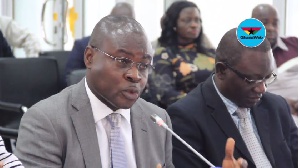 Professor Alex Dodoo, Director-General of the Ghana Standards Authority (GSA)
Professor Alex Dodoo, Director-General of the Ghana Standards Authority (GSA)
Professor Alex Dodoo, Director-General of the Ghana Standards Authority (GSA), has said increase in non-medical use of prescription drugs especially Tramadol tablet constitute an illegal, immoral and unacceptable situation and a reeking national security issue.
He said the Food and Drug Authority’s (FDA) position on the availability of the 50 mg and 100 mg in pharmacies and hospitals could be elicited only with prescription were clear and anything short of this should be treated as a criminal case and dealt with, he said in an interview with the Ghana News Agency.
He called for multi-sectoral approaches and strategies to curtail the Tramadol menace especially by the youths to safeguard their future.
Prof Dodoo said for medicine testing, the FDA and the United States Pharmacopeia (USP) formerly, Centre for Pharmaceutical Advancement and Training (CePAT), which were accredited laboratories were collaborating with GSA to test essential drugs and medicines.
He acknowledged that more accredited laboratories meant more business from within and without the country, as human resource to tackle this task was a non-starter.
The Director-General praised the FDA for taking drastic steps already to ban the cough mixtures containing codeine, which was another means of drug abuse, and were no longer available for children.
Meanwhile, according to a UN Report released on Tuesday, copied to the Ghana News Agency, drug production and markets were expanding to unprecedented levels and an increase in non-medical use of prescription drugs was leading to a worldwide public health crisis.
Yury Fedotov, Executive Director, UN Office on Drugs and Crimes, said “The findings of this year’s World Drug Report show that drug markets are expanding, with cocaine and opium production hitting absolute record highs, presenting multiple challenges on multiple fronts”.
The report warned that cocaine and methamphetamine markets were expanding “beyond their usual regions,” darknet drug trafficking keeps growing and non-medical use of prescription drugs has become a worldwide threat to public health and law enforcement.
At the same time, more new psychoactive substances were being synthesized and made available, with an associated increase in harm and fatalities.
Deaths directly caused by drug use increased by 60 per cent from 2000 to 2015.
While cocaine production had fallen between 2005 and 2013, it reached its highest level ever in 2016 with an estimate 1,410 tons, an increase of almost 60 percent from 2013. Most of the coca cultivation happened in Colombia.
While the fentanyl crisis in North America has been covered extensively in the media, a similar epidemic was happening in Africa with the use of another opioid called Tramadol, “rates of which are soaring” in parts of the continent.
A possible reason behind this trend might be a spill over of the “ongoing trafficking of heroin and pharmaceutical opioids in transit through Africa”.
Tramadol abuse is also expanding to Asia.
The report questions the strategy of the decades-long international war on drugs and pointed out the importance of drug treatment and health services, which “continue to fall short”.
Only one in six people suffering from drug use disorders were receiving treatment. Around 450,000 people died in 2015 as a result of drug use and over 160,000 of those were a direct result of drug disorders.
“The international community needs to step up its responses to cope with these challenges,” the report said.
While the overall amount of seized drugs has increased, the seized quantities were smaller, indicating that drug traffickers were choosing to reduce the losses resulting from intercepted packages.
The UN needs to improve “international cooperation and law enforcement capacities to dismantle organized criminal groups and stop drug trafficking,” the report said.